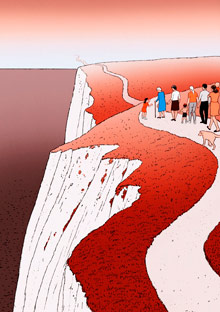Caring for Your Parents: How to Reclaim the Good Old Times

Illustration: Guy Billout
Shepherding fragile elders can leave a person lost and overwhelmed. Martha Beck offers a path back toward sanity.
I once attended a Navajo blessing ceremony, held in a tepee on the red sand of the Sonoran desert. The tepee was set up with great reverence, since to the Navajo, it symbolized the womb from which we all emerge, and the tent poles were "the bones of our grandmother." The word grandparents was spoken often and lovingly throughout the ceremony. The group's silver-haired matriarch quietly reigned over the gathering, with everyone else poised to supply her needs. It was a graceful dance of mutual care, with the elderly at the center. By contrast, our First World way of caring for the elderly is a clumsy, exhausting tarantella. It force-partners isolated caregivers (usually middle-aged women) with decline, disease, dementia, and death. As one woman told me, "Having aging parents simultaneously orphaned me, saddled me with two insane strangers, and shoved every nightmare about my own future right into my face." I heard many such stories as I researched this subject: Polly nearly bankrupted herself caring for her father, who has Alzheimer's. Brooke has barely slept since her ailing mother-in-law moved in. Jennifer had to testify against her parents in court so they'd be declared "incompetent to drive" before accidentally killing themselves or someone else.
This is what happens when a society forgets something people like the Navajo teach explicitly—that caring for the elderly is a "blessing path" in which the whole community should participate. Although our culture shows no signs of collectively adopting this perspective, there are ways to regain it on a case-by-case basis. If you're one of the 34 million or so Americans who are caring for an older relative, I offer my deep respect, and the following suggestions.



